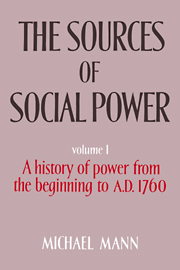Book contents
- Frontmatter
- Contents
- Preface
- 1 Societies as organized power networks
- 2 The end of general social evolution: how prehistoric peoples evaded power
- 3 The emergence of stratification, states, and multi-power-actor civilization in Mesopotamia
- 4 A comparative analysis of the emergence of stratification, states, and multi-power-actor civilizations
- 5 The first empires of domination: the dialectics of compulsory cooperation
- 6 “Indo-Europeans” and iron: expanding, diversified power networks
- 7 Phoenicians and Greeks: decentralized multi-power-actor civilizations
- 8 Revitalized empires of domination: Assyria and Persia
- 9 The Roman territorial empire
- 10 Ideology transcendent: the Christian ecumene
- 11 A comparative excursus into the world religions: Confucianism, Islam, and (especially) Hindu caste
- 12 The European dynamic: I. The intensive phase, A.D. 800–1155
- 13 The European dynamic: II. The rise of coordinating states, 1155–1477
- 14 The European dynamic: III. International capitalism and organic national states, 1477–1760
- 15 European conclusions: explaining European dynamism – capitalism, Christendom, and states
- 16 Patterns of world-historical development in agrarian societies
- Index
1 - Societies as organized power networks
Published online by Cambridge University Press: 26 December 2009
- Frontmatter
- Contents
- Preface
- 1 Societies as organized power networks
- 2 The end of general social evolution: how prehistoric peoples evaded power
- 3 The emergence of stratification, states, and multi-power-actor civilization in Mesopotamia
- 4 A comparative analysis of the emergence of stratification, states, and multi-power-actor civilizations
- 5 The first empires of domination: the dialectics of compulsory cooperation
- 6 “Indo-Europeans” and iron: expanding, diversified power networks
- 7 Phoenicians and Greeks: decentralized multi-power-actor civilizations
- 8 Revitalized empires of domination: Assyria and Persia
- 9 The Roman territorial empire
- 10 Ideology transcendent: the Christian ecumene
- 11 A comparative excursus into the world religions: Confucianism, Islam, and (especially) Hindu caste
- 12 The European dynamic: I. The intensive phase, A.D. 800–1155
- 13 The European dynamic: II. The rise of coordinating states, 1155–1477
- 14 The European dynamic: III. International capitalism and organic national states, 1477–1760
- 15 European conclusions: explaining European dynamism – capitalism, Christendom, and states
- 16 Patterns of world-historical development in agrarian societies
- Index
Summary
The three projected volumes of this book provide a history and theory of power relations in human societies. That is difficult enough. But a moment's reflection makes it seem even more daunting: For are not a history and theory of power relations likely to be virtually synonymous with a history and theory of human society itself? Indeed they are. To write a general account, however voluminous, of some of the principal patterns to be found in the history of human societies is unfashionable in the late twentieth century. Such grandly generalizing, Victorian ventures – based on imperial pillaging of secondary sources – have been crushed under the twentieth-century weight of massed volumes of scholarship and serried ranks of academic specialists.
My basic justification is that I have arrived at a distinctive, general way of looking at human societies that is at odds with models of society dominant within sociology and historical writing. This chapter explains my approach. Those uninitiated into social-science theory may find parts of it heavy going. If so, there is an alternative way of reading this volume. Skip this chapter, go straight to Chapter 2, or indeed to any of the narrative chapters, and continue until you get confused or critical about the terms used or the underlying theoretical drift. Then turn back to this introduction for guidance.
My approach can be summed up in two statements, from which a distinctive methodology flows. The first is: Societies are constituted of multiple overlapping and intersecting sociospatial networks of power. The distinctiveness of my approach will be perceived swiftly if I spend three paragraphs saying what societies are not.
- Type
- Chapter
- Information
- The Sources of Social Power , pp. 1 - 33Publisher: Cambridge University PressPrint publication year: 1986
- 3
- Cited by



